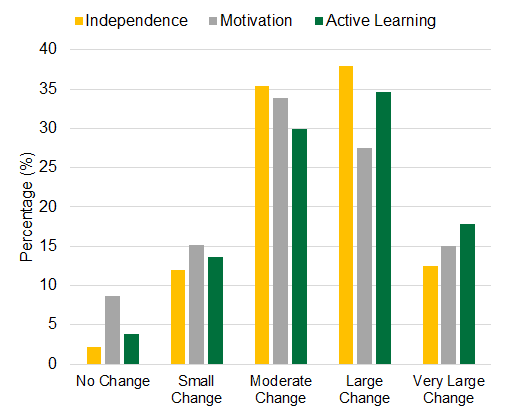Research Experiences for Undergraduates
Research Experiences for Undergraduates (REUs)
Some of the benefits cited by Seymour et al. (2004) include:
- Confidence in the ability to do research, “feeling like a scientist”
- Mentoring relationships with faculty and peer relationships with other students
- Knowledge and understanding of how science and research work
New/Improved skills in
- communication
- lab/field methods
- computer work
- reading comprehension
- collaborative work
Why do we want you to participate in REUs?
After an undergraduate research experience, 68% of students stated they had some increased interest in pursuing a STEM career and 29% developed a new expectation of obtaining a PhD (Russell et al. 2007).
In addition, there are positive changes in learning after the REU:

(Modified from Lopatto 2007)
- “I feel that I have become better able to think independently and formulate my own ideas”
- “I feel that I have become more intrinsically motivated to learn”
- “I feel that I have become a more active learner.”
Still undecided about applying for a research internship?
- MOST sites offer 10-week internships
- MOST are paid internships (NSF REUs are ~$5,000)
- MOST include assistance with housing and some even include meal plans.
- MOST pay for your travel to the site (within the US and overseas).
How do I find the right research program?
There are multiple resources available to find the right program. UNC Charlotte’s Office of Undergraduate Research is a great place to start.
Opportunities at UNC Charlotte
Department of Biological Sciences (BIO 3900)
Biology, Honors Program (HONORS)
Charlotte Research Scholars (CRS)
Charlotte Community Scholar Program (CCS)
External Programs
National Science Foundation REU Program (NSF-REU)
Pathways to Science – Institute of Broadening Participation (IBP)
Application Requirements
For most applications, you will need:
- A resume or CV
- Recommendation letters
- A personal statement describing your professional background, your career plans, and/or research interests.
Please visit UNC Charlotte’s Career Center for additional resources!
References
Lopatto, D. 2007. Undergraduate Research Experiences Support Science Career Decisions and Active Learning. CBE Life Sci Educ 6(4). doi.org/10.1187/cbe.07-06-0039
Russell S. H., Hancock M. P., McCullough J. 2007. Benefits of undergraduate research experiences. Science 316 doi.org/10.1126/science.1140384
Seymour, E., Hunter, A.-B., Laursen, S. L., and Deanton, T. 2004. Establishing the benefits of research experiences for undergraduates in the sciences: First findings from a three-year study. Science Education 88 doi.org/10.1002/sce.10131